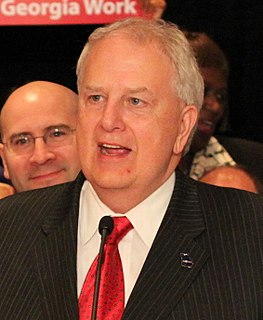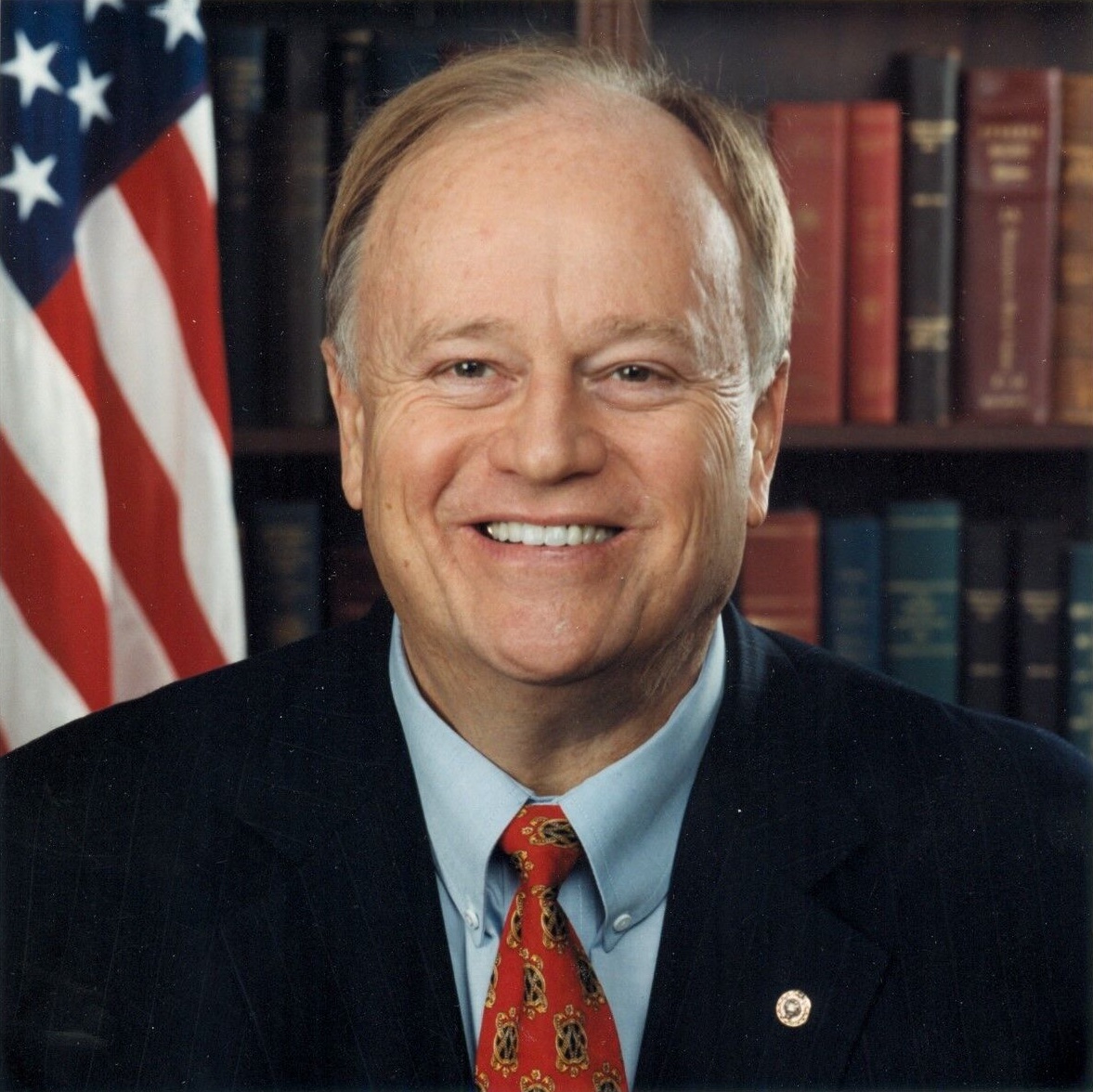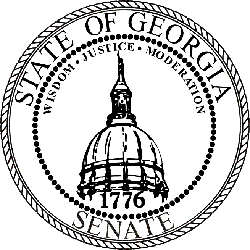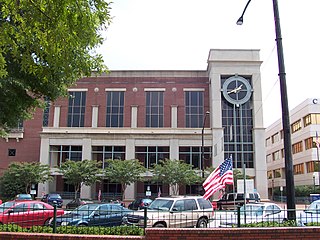
The 2006 Georgia gubernatorial election was held on November 7, 2006. Incumbent Republican Governor Sonny Perdue ran for re-election to a second and final term as governor. Governor Perdue was renominated by the Republican Party, defeating a minor opponent in the process, while Lieutenant Governor Mark Taylor narrowly emerged victorious from a competitive Democratic primary. In the general election, though Taylor ran a spirited campaign, Perdue was aided by the increasing tendency of the state to vote for Republicans and by his popularity with the public; polling showed his approval ratings above sixty percent. In the end, Perdue was overwhelmingly re-elected as governor, defeating Taylor in a landslide.

The Iowa gubernatorial election of 2006 took place November 7, 2006. The incumbent governor, Tom Vilsack, a Democrat, had served two terms and decided not to seek a third term. In the election, Chet Culver defeated Jim Nussle to win the governorship, by a margin of 54.4 percent to 44.1 percent. As of 2019, this is the last time a Democrat has won the governorship of Iowa.

The 2006 Nebraska gubernatorial election was held on November 7, 2006; the primary election was held on May 9, 2006. Republican incumbent Dave Heineman was elected to a full term, defeating Democrat David Hahn.

The 2006 Oregon gubernatorial election took place on November 7, 2006. Incumbent Democratic Governor of Oregon Ted Kulongoski ran for a second and final term as governor. Kulongoski faced several challengers in his primary, whom he dispatched to win his party's nomination a second time, while Republican nominee Ron Saxton, the former Chair of the Portland Public Schools Board and a candidate for governor in 2002 emerged from a crowded primary. Kulongoski and Saxton were initially going to be challenged in the general election by State Senator Ben Westlund, but Westlund withdrew his candidacy before the general election. There were, however, a number of strong independent challengers, the most notable of whom was Mary Starrett, the Constitution Party nominee. In a hard-fought campaign, Kulongoski won re-election by a surprisingly wide margin, winning his second term as governor.

United States gubernatorial elections were held on November 5, 2002 in 36 states and two territories. The Republicans won eight seats previously held by the Democrats, as well as the seat previously held by Minnesota governor Jesse Ventura, who was elected on the Reform Party ticket but had since renounced his party affiliation. The Democrats won 10 seats previously held by the Republicans, as well as the seat previously held by Maine governor Angus King, an independent. Overall, the Republicans suffered a net loss of one seat while the Democrats made a net gain of three. The Republicans managed to maintain their majority of state governorships, but it was reduced to a margin of only two seats. The elections were notable for the sheer number of state governorships that changed parties – 20 in total, constituting more than half of the seats up for election.

The 2002 Idaho gubernatorial election was held on November 5, 2002 to select the governor of the state of Idaho. Dirk Kempthorne, the Republican incumbent, defeated Democratic nominee Jerry Brady to win a second term, but the win was not nearly as overwhelming as Kempthorne's 1998 victory.

The 1994 Idaho gubernatorial election was held on November 8, 1994 to select the governor of the U.S. state of Idaho. Cecil D. Andrus, the Democratic incumbent, chose not to seek reelection after a total of 14 years in office. Former state senator and Republican Party chair Phil Batt engineered a come-from-behind victory to defeat Democratic Attorney General Larry Echo Hawk. Batt's victory put the Idaho statehouse in Republican hands for the first time since 1970.

The 2010 Georgia gubernatorial election was held on November 2, 2010. Incumbent Republican Governor Sonny Perdue was term-limited and unable to seek re-election. Primary elections for the Republican and Democratic parties took place on July 20, with a Republican runoff on August 10. The Libertarian Party also had ballot access and nominated John Monds. On November 2, 2010, Barnes conceded to Nathan Deal. He took office on January 10, 2011.

The 2002 California lieutenant gubernatorial election occurred on November 5, 2002. The primary elections took place on March 5, 2002. The Democratic incumbent, Cruz Bustamante, defeated the Republican nominee, State Senator Bruce McPherson.
Georgia's state elections will be held on November 4, 2008. The primary elections were held on February 5, also known as Super Tuesday.

The 1996 United States Senate election in Georgia was held on November 5, 1996. Incumbent Democratic United States Senator Sam Nunn decided to retire instead of seeking a fifth term. The Republican Party nominated Guy Millner, a multi-millionaire businessman who was also the unsuccessful candidate who ran against Zell Miller in the 1994 gubernatorial election. Millner emerged as the victor from a crowded 6-person primary in July 1996. However, Max Cleland, the Secretary of State of Georgia ran unopposed in the Democratic primary.

The Maine gubernatorial election of 2002 took place on November 5, 2002. Incumbent Independent Governor Angus King was term limited, and unable to seek re-election. United States Congressman John Baldacci won the Democratic primary uncontested, while former State Representative Peter Cianchette emerged from the Republican primary victorious. Baldacci and Cianchetti squared off in the general election, joined by Jonathan Carter, the Green Party nominee, and independent State Representative John Michael. Ultimately, Baldacci prevailed over Cianchette to win what would be his first of two terms as governor, with Carter taking an unusually high amount of the vote for a third-party candidate.

The 1998 Georgia gubernatorial election was held on November 3, 1998. Incumbent Democratic Governor Zell Miller was unable to seek re-election due to term limits, therefore creating an open seat. To replace him, State Representative Roy Barnes won the Democratic Party's nomination after a close and highly contested primary election, while businessman Guy Millner, who had run for Governor and the United States Senate in the previous four years, won the nomination of the Republican Party. In the general election, Barnes was able to defeat Millner by a margin of victory larger than Governor Miller's victory over Millner four years prior, which was in part due to the unpopularity and controversy of Mitch Skandalakis, the Republican nominee for Lieutenant Governor of Georgia. As of 2018, this is the most recent election in which a Democrat was elected Governor of Georgia.

The 1994 Georgia gubernatorial election occurred on November 8, 1994, to elect the next Governor of Georgia from 1995 to 1999. Incumbent Democratic Governor Zell Miller, first elected in 1990, ran for a second term. In his party's primary, Miller received three challengers, but easily prevailed with just over 70% of the vote. The contest for the Republican nomination, however, was a competitive race. As no candidate received a majority of the vote, John Knox and Guy Millner advanced to a run-off election. Millner was victorious and received the Republican nomination after garnering 59.41% of the vote.
The 2010 Georgia statewide elections were held on November 2, 2010 in the U.S. state of Georgia. The primary elections were held on July 20. Primary contests in which no single candidate received a majority of the vote were decided in a runoff election on August 10.

When incumbent Democratic Governor Jeanne Shaheen opted to run for the United States Senate rather than seek a fourth term as governor, self-funding businessman Craig Benson, the Republican nominee defeated Mark Fernald, a New Hampshire State Senator and the Democratic nominee, in the general election after each of them won contested primary elections.






















